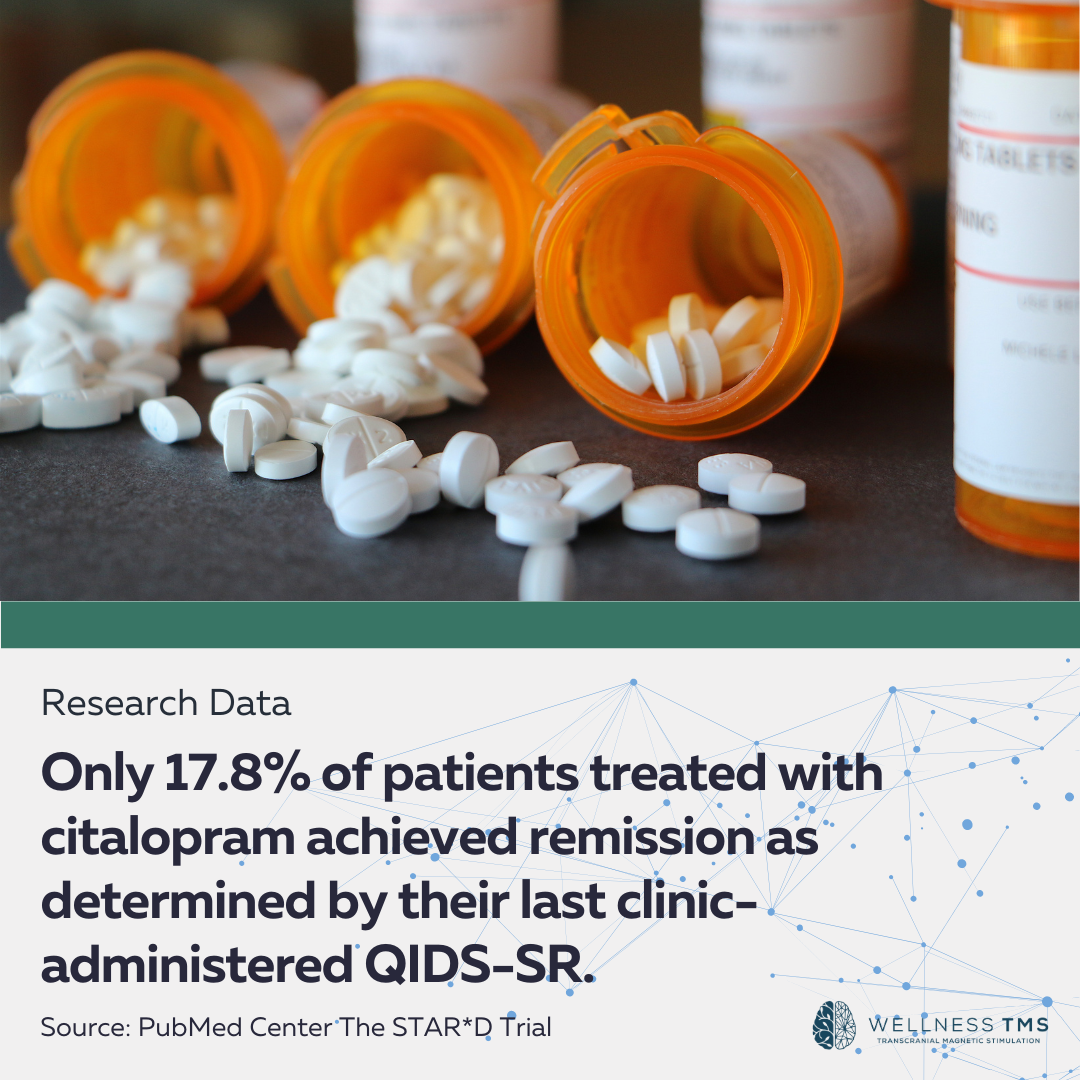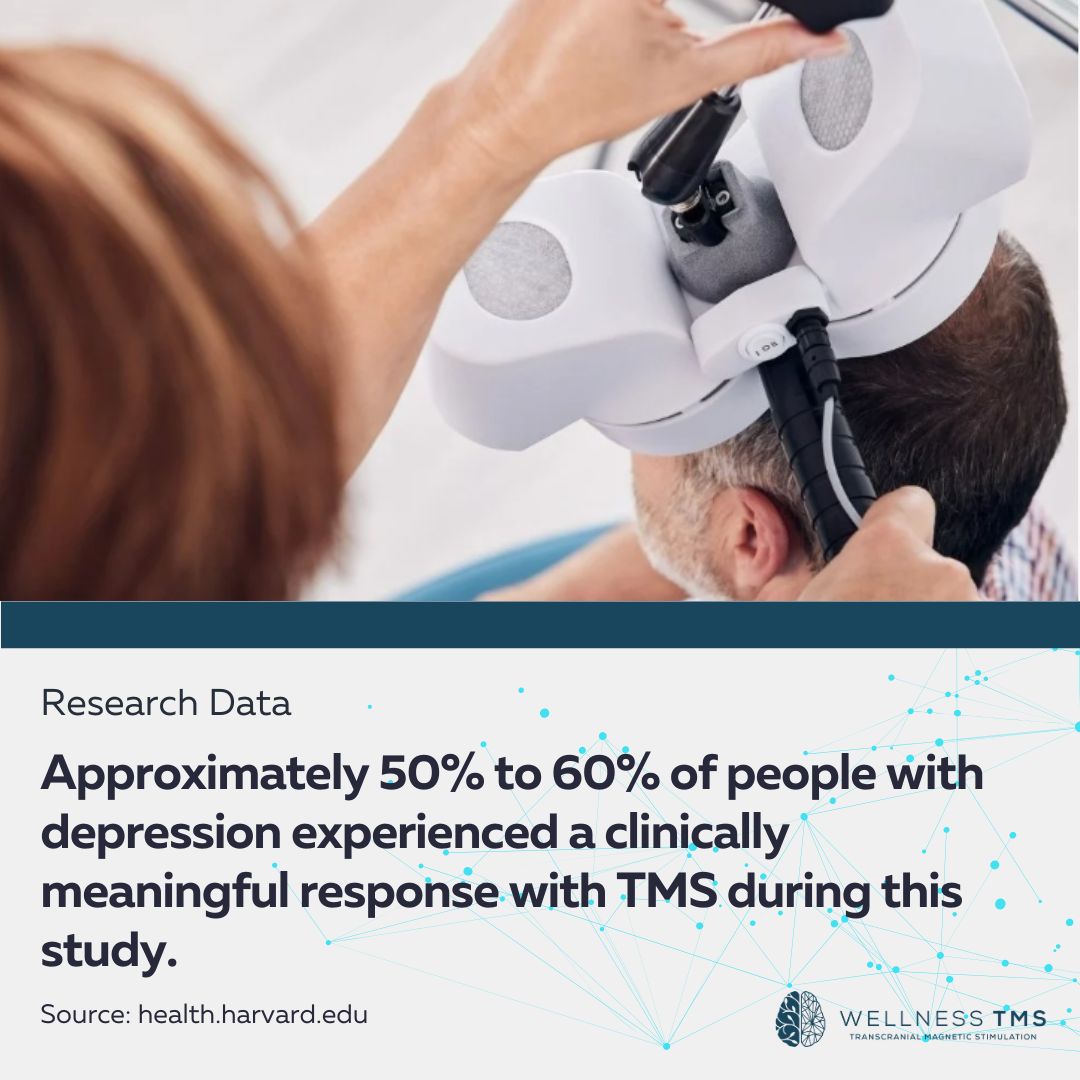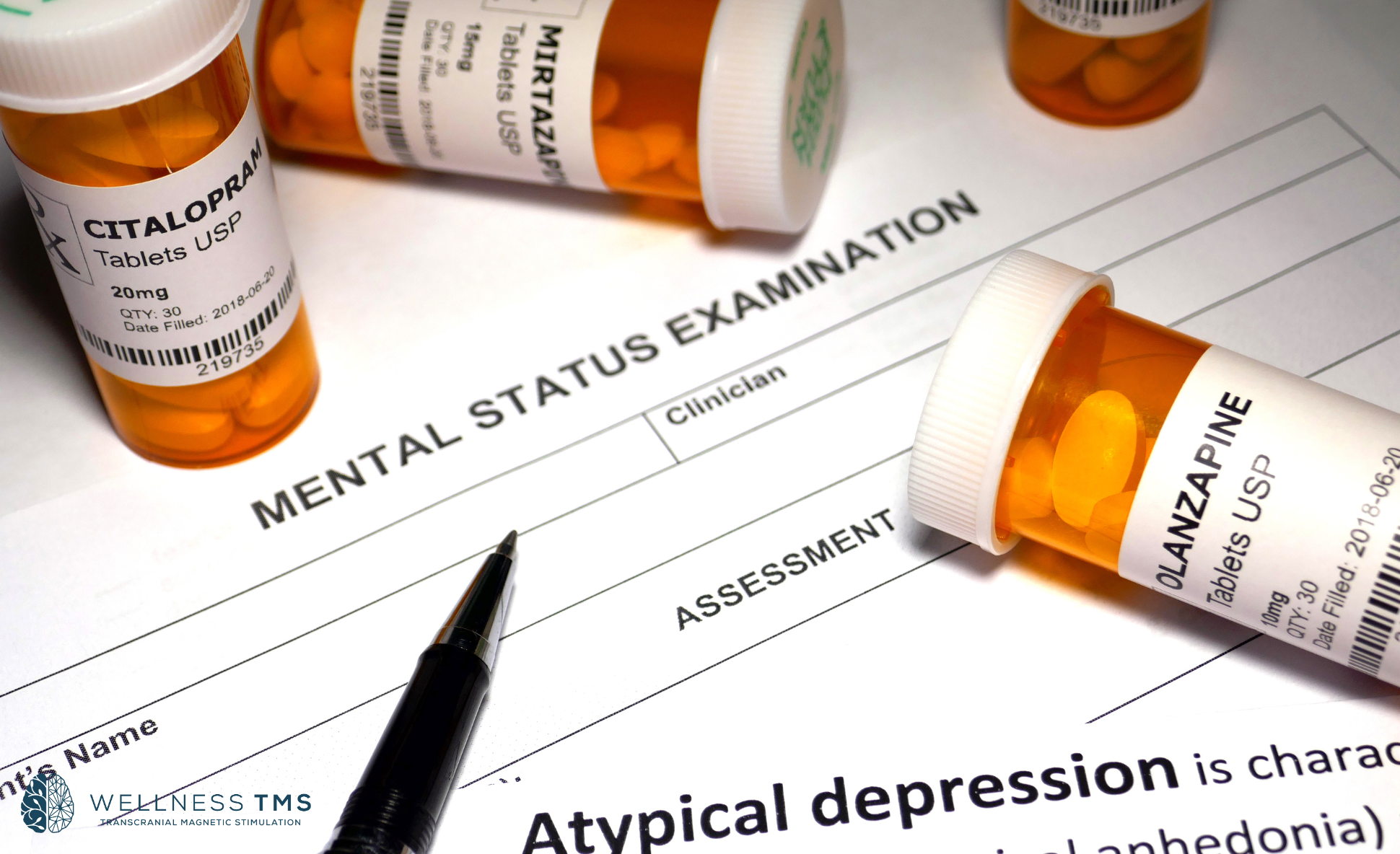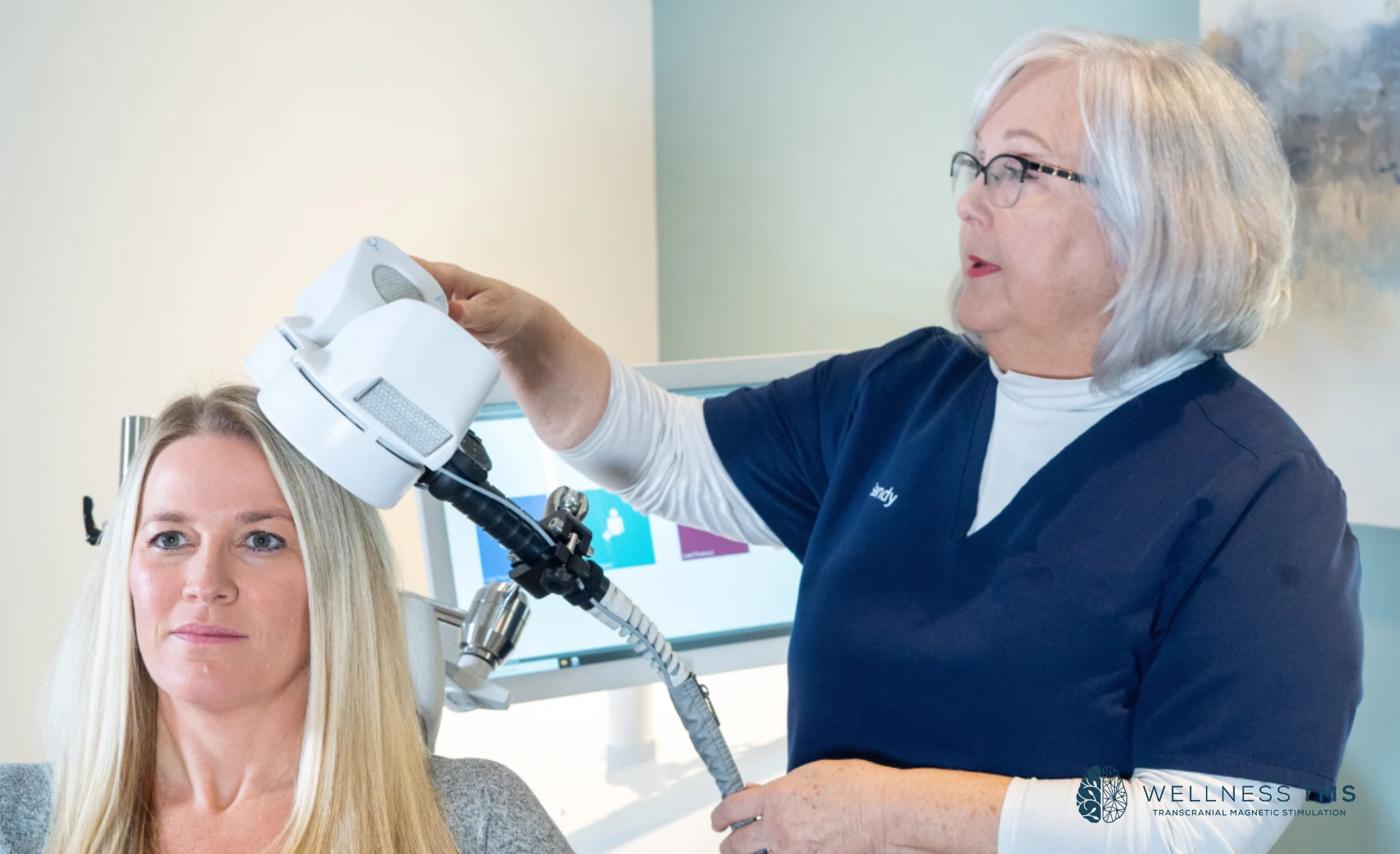Highlights:
- Risks of Antidepressant Use: The article discusses a study from the British Journal of Psychiatry Open, which indicates that prolonged antidepressant use is associated with increased risks of cardiovascular diseases (CVD), coronary heart disease (CHD), and all-cause mortality. This risk was observed even after adjusting for various factors, suggesting potential concerns regarding the long-term use of antidepressants.
- Balancing Risks and Benefits: While individuals on antidepressants faced higher risks of certain health conditions, such as CHD and CVD, they also showed a lower likelihood of developing hypertension and diabetes. However, it’s unclear whether these benefits are directly linked to antidepressant use or effective management of depression itself.
- Alternative Treatments: The article highlights transcranial magnetic stimulation (TMS) as a non-invasive therapy option for managing depression, including major depressive disorder (MDD). TMS utilizes magnetic fields to target specific brain areas, with promising outcomes reported in recent studies. Its effectiveness, coupled with FDA clearance and increasing insurance coverage, positions TMS as a viable alternative or adjunctive therapy to antidepressants.
- Insights from the STAR*D Trial: The Sequenced Treatment Alternatives to Relieve Depression (STAR*D) trial is referenced to underscore the diminishing efficacy of antidepressants across successive treatment stages. This emphasizes the need for alternative treatments like TMS, which offers hope particularly to non-responders and aligns with the call for personalized treatment approaches.
Benefits and Considerations in Depression Treatment
On the positive side, antidepressant users demonstrated a 23% lower risk of hypertension and a 32% reduced likelihood of developing diabetes compared to non-users. However, it’s unclear whether these benefits directly stem from antidepressant use or from effectively managing depression, regardless of treatment modality. Commonly prescribed antidepressants included SSRIs, trazodone, mirtazapine, duloxetine, and venlafaxine.The Prevalence and Safety of Antidepressants
Antidepressants serve as the primary treatment for depression, with a significant increase in prescriptions over the past decade attributed to long-term treatment rather than a rise in depression incidence. However, studies on their long-term safety are scarce, given the predominance of short-term trials. Given depression’s association with CVD risk factors, understanding the cardiometabolic implications of antidepressant use is imperative, alongside a closer examination of various contributing factors. This study emphasized demographics, socioeconomic status, health status, and other key factors, though it notably lacked diversity in its participant pool.Dependency and Treatment Alternatives
Over the follow-up period of five to ten years, approximately 7% of participants received new antidepressant prescriptions, primarily SSRIs. Long-term use of antidepressants was associated with increased risks of diabetes, all-cause mortality, and CHD, alongside a reduced risk of diabetes at the five-year mark. Transcranial Magnetic Stimulation (TMS) emerges as a non-invasive therapy option for various mental disorders, including MDD and depression. It utilizes magnetic fields to target specific brain areas, with initial sessions yielding lasting results for several months. Recent studies have shown promising outcomes with TMS treatment, prompting FDA clearance and increasing insurance coverage. Treating the brain itself rather than solely addressing symptoms presents a compelling alternative, reflected in clinical data.Examining the Long-Term Effects of Antidepressant Use
Living with depression, especially major depressive disorder (MDD), often entails long-term management, frequently involving prescription antidepressants. Yet, many individuals seek to reduce their reliance on these medications or discontinue them altogether, under medical supervision. Wellness TMS offers alternatives like transcranial magnetic stimulation (TMS) for those considering a shift in their treatment approach. A recent study published in the British Journal of Psychiatry Open sheds light on the potential risks associated with prolonged antidepressant use. Researchers analyzed a decade of data from the UK Biobank, comprising over 220,000 adults, to investigate the link between antidepressant use and adverse health outcomes, including cardiovascular disease (CVD), cerebrovascular disease (CV), coronary heart disease (CHD), and overall mortality. The findings revealed that individuals on antidepressants faced twice the risk of developing CHD, CVD (along with related mortality), and had increased overall mortality compared to non-users, even after accounting for other factors. However, it’s crucial to consider the full context.Balancing the Risks and Benefits
While antidepressant users showed elevated risks for certain conditions, they also exhibited a lower likelihood of developing hypertension and diabetes. However, this association doesn’t necessarily imply causation; factors like effective depression treatment may contribute to these outcomes. Notably, SSRIs, trazodone, mirtazapine, duloxetine, and venlafaxine were among the most commonly prescribed antidepressants. The data provided by STAR*D investigators regarding the sustainability of treatment benefits are even less promising. For step 1, only 17.8% of patients treated with citalopram achieved remission as determined by their last clinic-administered QIDS-SR and did not experience confirmed relapse during follow-up, based on at least one of the 12 monthly telephonic QIDS-SR assessments. After up to four rounds of antidepressant drug combination treatments, the cumulative rate of patients without confirmed relapse increased only to 23.5%.
Dependency and Treatment Alternatives
Over the follow-up period of five to ten years, approximately 7% of participants received new antidepressant prescriptions, primarily SSRIs. Long-term use of antidepressants was associated with increased risks of diabetes, all-cause mortality, and CHD, alongside a reduced risk of diabetes at the five-year mark. Transcranial Magnetic Stimulation (TMS) emerges as a non-invasive therapy option for various mental disorders, including MDD and depression. It utilizes magnetic fields to target specific brain areas, with initial sessions yielding lasting results for several months. Recent studies have shown promising outcomes with TMS treatment, prompting FDA clearance and increasing insurance coverage. Treating the brain itself rather than solely addressing symptoms presents a compelling alternative, reflected in clinical data.Examining the Long-Term Effects of Antidepressant Use
Living with depression, especially major depressive disorder (MDD), often entails long-term management, frequently involving prescription antidepressants. Yet, many individuals seek to reduce their reliance on these medications or discontinue them altogether, under medical supervision. Wellness TMS offers alternatives like transcranial magnetic stimulation (TMS) for those considering a shift in their treatment approach. A recent study published in the British Journal of Psychiatry Open sheds light on the potential risks associated with prolonged antidepressant use. Researchers analyzed a decade of data from the UK Biobank, comprising over 220,000 adults, to investigate the link between antidepressant use and adverse health outcomes, including cardiovascular disease (CVD), cerebrovascular disease (CV), coronary heart disease (CHD), and overall mortality. The findings revealed that individuals on antidepressants faced twice the risk of developing CHD, CVD (along with related mortality), and had increased overall mortality compared to non-users, even after accounting for other factors. However, it’s crucial to consider the full context.Balancing the Risks and Benefits
While antidepressant users showed elevated risks for certain conditions, they also exhibited a lower likelihood of developing hypertension and diabetes. However, this association doesn’t necessarily imply causation; factors like effective depression treatment may contribute to these outcomes. Notably, SSRIs, trazodone, mirtazapine, duloxetine, and venlafaxine were among the most commonly prescribed antidepressants. The data provided by STAR*D investigators regarding the sustainability of treatment benefits are even less promising. For step 1, only 17.8% of patients treated with citalopram achieved remission as determined by their last clinic-administered QIDS-SR and did not experience confirmed relapse during follow-up, based on at least one of the 12 monthly telephonic QIDS-SR assessments. After up to four rounds of antidepressant drug combination treatments, the cumulative rate of patients without confirmed relapse increased only to 23.5%.
Insights from the STAR*D Trial
The Sequenced Treatment Alternatives to Relieve Depression (STAR*D) trial offers critical insights into antidepressant effectiveness. Conducted over several years, STAR*D aimed to evaluate various antidepressant therapies’ efficacy in MDD patients. Notably, the trial highlighted diminishing antidepressant efficacy across successive treatment stages, emphasizing the need for alternative treatments like TMS.
Aligning STAR*D Findings with TMS
While the STAR*D trial underscores antidepressants’ limitations, TMS emerges as a promising alternative or adjunctive therapy for depression. Offering hope to non-responders, TMS aligns with the call for personalized treatment approaches. With its favorable safety profile and effectiveness, TMS presents a compelling option for individuals seeking relief from depression when conventional medications fall short.
Resources:
- https://www.ncbi.nlm.nih.gov/pmc/articles/PMC4314062/
- https://www.health.harvard.edu/blog/transcranial-magnetic-stimulation-for-depression-2018022313335
- https://www.sciencedirect.com/science/article/pii/S1935861X17309609
- https://www.ncbi.nlm.nih.gov/pmc/articles/PMC4314062/bin/CJP-2015-vol60-January-9-13-eTable1.pdf


